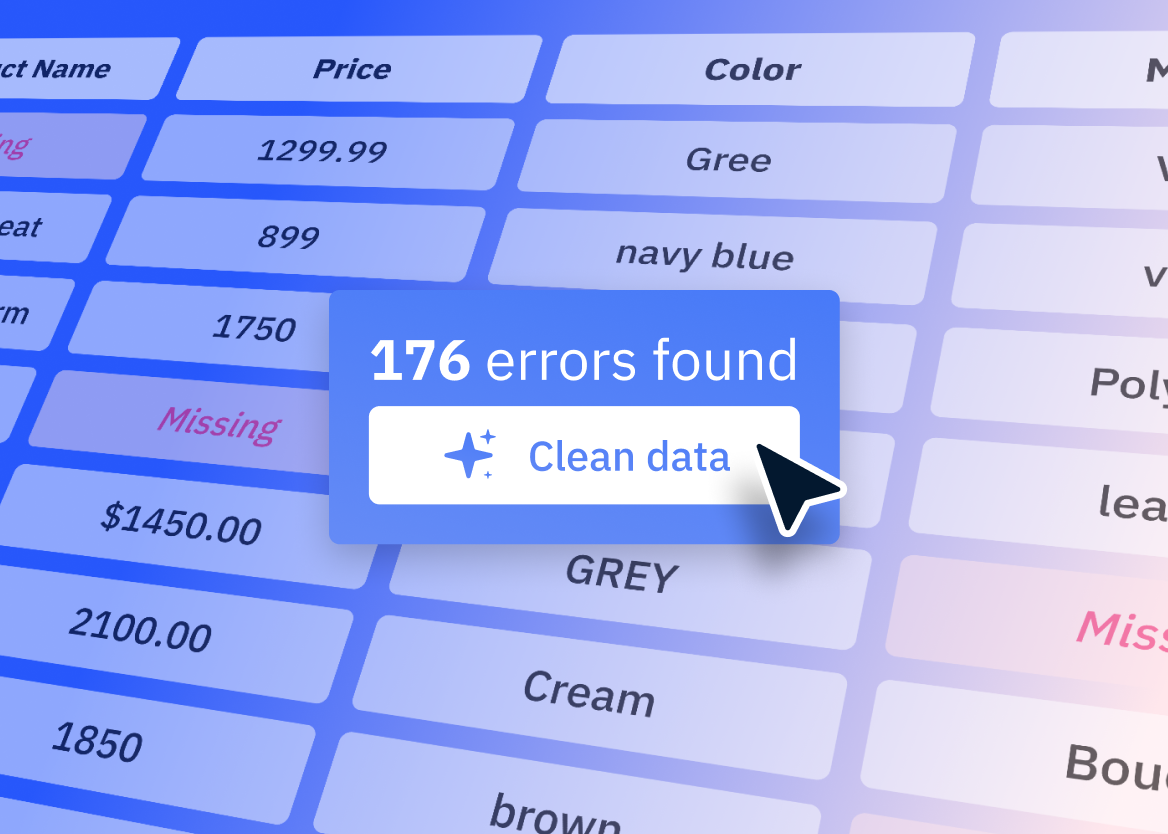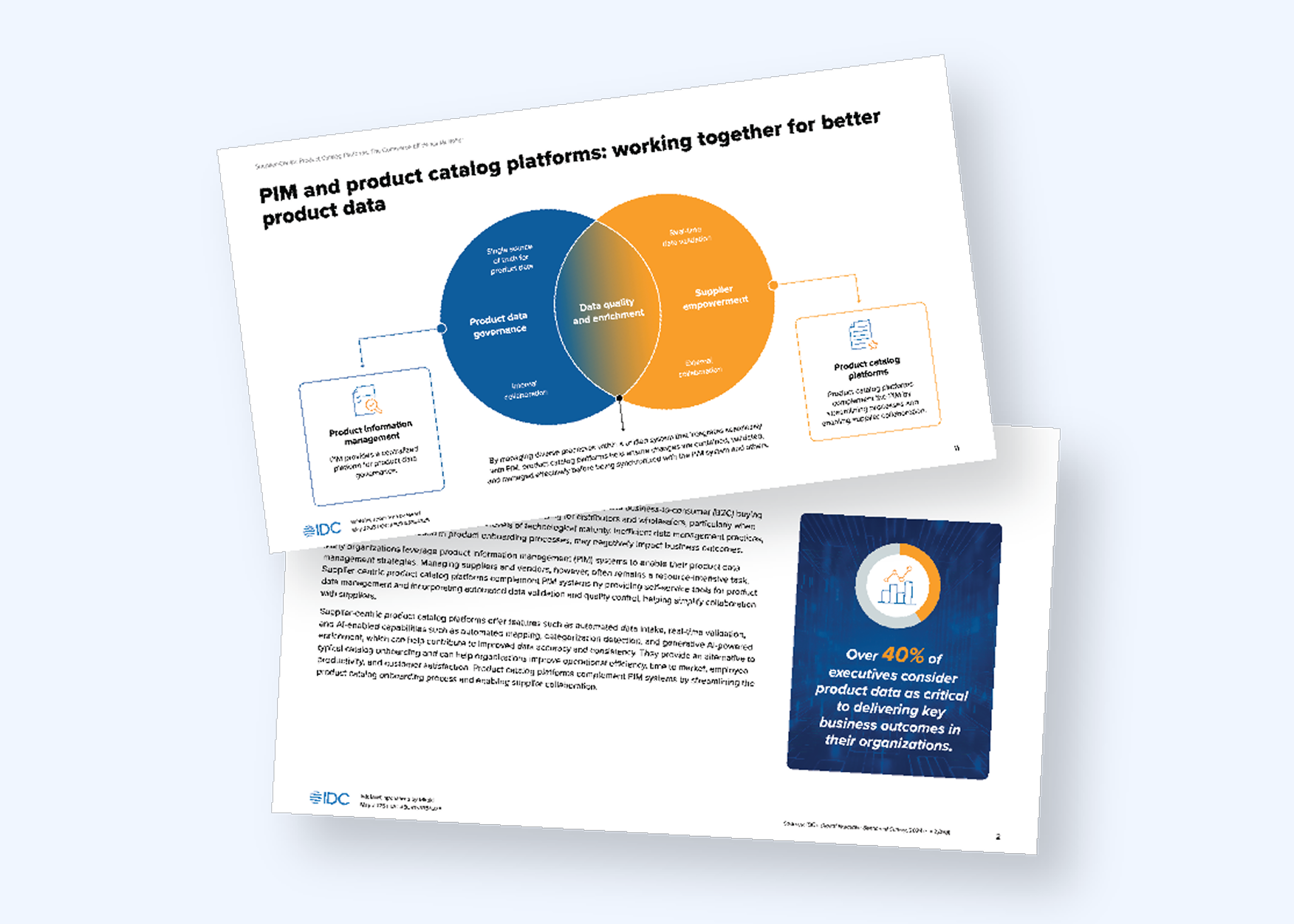Suppliers care about product data. Here’s why retailers should too.

Suppliers care about product data. Here’s why retailers should too.
Most retailers view product catalog management through a narrow operational lens, focusing solely on their internal efficiency metrics.
This perspective isn't just limited — it's potentially damaging to your competitive advantage.
Here's an uncomfortable truth: your approach to product data management isn't just a back-office function, but a strategic lever that directly impacts supplier relationships and, ultimately, your market position. In fact, neglecting this can lead to supplier frustration and the risk of them taking their most valuable offerings elsewhere.
Supplier product data: The strategic blindspot you can't afford
While retailers focus on streamlining internal processes, their suppliers are struggling with a challenge that directly impacts business success. Every supplier partnership, regardless of size or technical sophistication, must navigate the retailer’s product data integration processes.
What many retail leaders fail to recognize is that this seemingly routine operational process is actually a critical touchpoint that shapes the entire supplier relationship lifecycle.
Consider this: A cumbersome, error-prone onboarding process doesn't just create internal inefficiencies — it fundamentally erodes supplier trust and commitment.
When suppliers find themselves caught in endless cycles of data corrections and unclear requirements (i.e. “the endless ask”), they become less invested in your success. Some may even redirect their premium products and innovation launches to competitors who offer a more streamlined experience.
The true cost of poorly maintained supplier product data
The traditional approach to product data management carries hidden costs that extend far beyond operational inefficiencies. Those include:
Lost innovation opportunities: Suppliers burdened by complex data processes are less likely to prioritize a retailer’s platform for new product launches, potentially delaying the retailer’s access to market innovations.
Resource drain: Retailers’ internal teams spend valuable time managing data discrepancies instead of focusing on strategic initiatives that drive growth.
Market agility impact: When product onboarding is slowed by manual processes and constant back-and-forth, retailers lose the ability to quickly respond to market trends and consumer demands.
Supplier partnership erosion: The cumulative effect of difficult data processes can transform strategic suppliers into transactional vendors, limiting retailers’ access to exclusive opportunities and insights.
A strategic imperative for retailers
Forward-thinking retailers are recognizing that automated, supplier-friendly product data management doesn’t just create operational efficiency, but a competitive advantage.
By implementing intelligent systems with automated validation mechanisms and bulk upload capabilities, you're not just streamlining processes — you're building a foundation for stronger supplier partnerships that drive mutual growth.
Loading...
A new paradigm for product data management
The most successful retailers are shifting their approach in three key ways:
Empowerment over control: Instead of forcing suppliers to adapt to rigid systems, they provide intuitive tools that allow suppliers to manage data proactively.
Partnership over process: They view product data management as an opportunity to strengthen supplier relationships rather than just a procedural requirement.
Strategic over tactical: They recognize that efficient product data management isn't just about reducing errors, but about creating a more agile, responsive retail operation.
The reality is clear: Your approach to product data management isn't just an operational choice, it's a strategic decision that impacts your competitive position.
With that in mind, the question isn't whether to optimize your product data processes, but how quickly you can transform them to create a true competitive advantage.
To ensure sustained growth and greater operational agility, retailers must fundamentally rethink product data management.
It's no longer simply about stocking shelves but about establishing a framework through stronger supplier relationships. Retailers embracing this perspective will be better equipped to seize market opportunities and foster lasting growth.
How Mirakl Catalog Platform can help
Mirakl Catalog Platform offers a strategic approach to product data management and onboarding, addressing key challenges faced by retailers and distributors, today.
It helps improve product data quality by aggregating and harmonizing product data from various suppliers, leading to more complete and accurate product sheets—ultimately fostering trust and buyer confidence through a single, global SKU with detailed information.
The platform streamlines catalog integration for suppliers through flexible methods and pre-built integrations, enhancing their self-service capabilities and automating data governance. This allows suppliers to onboard their catalogs more quickly, enabling faster selling that strengthens supplier relationships.
For retailers and distributors, Mirakl Catalog Platform reduces the manual effort involved in integrating and maintaining new supplier catalogs, saving time in managing large volumes of products and data sets. By leveraging business rules and automation, it efficiently ingests massive amounts of product data, contributing to increased operational efficiency.
Learn more about the importance of supplier product data, and how it can make or break your competitive advantage, by reading the latest IDC study here.



